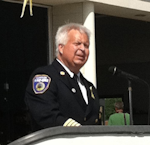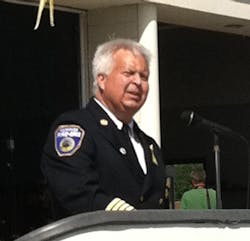When an icon exits the stage, there are bound to be many great eulogies and memories given. Surely this will be true with the passing of the fire service’s great icon Chief Alan Brunacini. When I heard the news, I was shocked. Such a person, someone who is so larger than life, shouldn’t die.
I wish I could say that I was a close friend of his. I wish I could say that I knew him well. I wish I could say that he knew me. I didn’t, and I’m pretty sure he didn’t. I represent the thousands, if not tens of thousands, of regular guys who he impacted. I was lucky enough to see him speak 15 or 20 times over my career. The first time had to be in 1980 or 1981, when he came to Chesterfield County, VA, to teach a bunch of us this new-fangled thing that was evolving called “incident command.”
I was a young firefighter at the time, 20 or so years old, and getting ready to take my first promotional test. So I thought, heck it couldn’t hurt to spend one weekend listening to this guy I had never heard of, from some far-off land called Phoenix. It was great. While I sat in the auditorium listening to this man, I had a revelation.
I remember it vividly because it was one of the first great “ah-ha” moments of my life. It was one of those rare moments of mental clarity when everything comes into focus. I quickly realized that the chief was not teaching incident command; he was teaching leadership. He was getting us kids ready to become leaders in our companies and our departments.
I followed his words and his writings the rest of my career. I listened to him speak of fireground safety, RIT, customer service, etc. But each time, the sermon I heard was leadership. It really didn’t matter the subject; the underlying theme was always be a leader and here’s how!
I became aware that being a leader meant you had to display certain traits, and Bruno was teaching us those traits by example. He taught me that to be a leader one must:
1. Be humble
All leaders should be humble, like he was. Whenever he walked in a room, it was clear within a couple minutes (to everyone except Bruno) that he was the smartest guy there. He was humble, he listened, he considered, and he shared. It didn’t matter your rank, he spoke like a firefighter to each and everyone one of us, well, like we were firefighters, whether we deserved it or not.
2. Be curious
Brunacini was a thinker. Speaking with him it was clear that he was always studying, always learning, always curious.
3. Be courageous
Brunacini taught us all that a leader has the courage to be wrong. He was his own worst critic. When the RIT he designed in Phoenix did not live up to expectations on a scene, he wanted to know why. He wanted to understand what failed, and he wanted to get it right. He opened it up to public criticism and in doing so, he opened himself up also.
4. Be a teacher
He taught and taught and taught. Kids like myself, seasoned firefighters, other chiefs. He also inherently knew that a great teacher inspires others to do the same thing. Just look at the wonderful generation of teachers he spawned. Like him, what they teach is under the guise of other subjects. Whether it is pride and ownership or situational awareness or the newest science on flow paths and fire attack, they too are really teaching leadership. They are following in the footsteps of Bruno. They too are inspiring a new generation to preach the Gospel of Leadership in their footsteps.
He also taught that to be a teacher, you needed to speak to your audience. He saw no need for academic language that most people use to show they are educated. He taught me to speak plainly, clearly and in a language that is common to the people with whom you are speaking.
5. Be yourself
Bruno taught that leaders are not pale shadows of someone else. They are individuals who play to their talents. They are people who step up and simply be themselves, with all of their greatness and all of their warts proudly on display for the world to see. Perhaps this is his greatest lesson—that everyone can be a leader, and everyone should be one.
Live these values
When someone dies, we tend to reminisce. As everyone thinks of this leader, this icon and pioneer who touched so many, maybe the best way to honor him is to rededicate ourselves to the things he taught us, to keep him alive by living the values he lived.
One of the greatest things I ever heard him say was that he had been studying leadership his entire life. After all of that time, he wasn’t sure that he could tell you what leadership was, that a definition was elusive. But he could recognize when he saw it. I can also recognize leadership when I see it. I saw it each time I saw Bruno. I suggest that if people really want to honor him, they should work to make sure they see it when they look at themselves in the mirror.

Fred Crosby
Fred Crosby is a retired chief with 38 years in fire and EMS. He began his career as a firefighter in Chesterfield County, VA, where he served in the EMS Medflight Program at its inception. He moved to Hanover County, where he spent the next 28 years of his career, eventually retiring as chief of fire and EMS. After retiring in Virginia, he spent two years as chief of the Horry County Fire and Rescue Department prior to retiring permanently.






